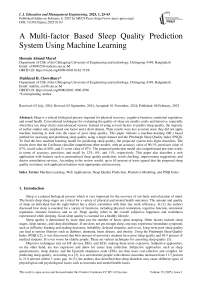A Multi-factor based Sleep Quality Prediction System Using Machine Learning
Автор: Hossain Ahmad Maruf, Mahfuzul H. Chowdhury
Журнал: International Journal of Education and Management Engineering @ijeme
Статья в выпуске: 1 vol.15, 2025 года.
Бесплатный доступ
Sleep is a critical biological process required for physical recovery, cognitive function, emotional regulation, and sound health. Conventional techniques for evaluating the quality of sleep are usually costly and intrusive, especially when they use sleep clinics and advanced sensors. Instead of using several factors to predict sleep quality, the majority of earlier studies only employed one factor and a short dataset. Their results were less accurate since they did not apply machine learning to look into the cause of poor sleep quality. This paper initiates a machine-learning (ML) based method for assessing and predicting sleep quality using a larger dataset and the Pittsburgh Sleep Quality Index (PSQI). To find the best machine learning model for predicting sleep quality, the proposed system tests eight classifiers. The results show that the Cat Boost classifier outperforms other models, with an accuracy value of 90.1%, precision value of 87%, recall value of 88%, and f1-score value of 87%. The proposed prediction model also outperformed previous works in terms of accuracy, precision, and recall by 12%, 8%, and 11%, respectively. This paper also describes a web application with features such as personalized sleep quality prediction, result checking, improvement suggestions, and doctor consultation services. According to the review results, up to 65 percent of users agreed that the proposed sleep quality assistance web application features were appropriate and necessary.
Machine Learning, Web Applications, Sleep Quality Prediction, Predictive Modeling, and PSQI Index
Короткий адрес: https://sciup.org/15019635
IDR: 15019635 | DOI: 10.5815/ijeme.2025.01.03
Список литературы A Multi-factor based Sleep Quality Prediction System Using Machine Learning
- M. R. Irwin et al., “Why sleep is important for health: A psychoneuroimmunology perspective,” Annual Review of Psychology, vol. 66, pp. 143–172, 2015.
- D. J. Buysse et al., “The pittsburgh sleep quality index: A new instrument for psychiatric practice and research,” Psychiatry Research, vol. 28, no. 2, pp. 193– 213, 1989.
- S.-P. Cheng et al., “A personalized sleep quality assessment mechanism based on sleep pattern analysis, ” Third International Conference on Innovations in Bio-Inspired Computing and Applications, 2012, pp. 133–138
- I. Nakari et al., “Wake detection during sleep using random forest for sleep apnea syndrome patient, ” in AAAI Spring Symposium, pp. 1-7, 2019.
- W. Chong-Wen et al., “Predictors of rapid eye movement sleep behavior disorder in patients with parkinson’s disease based on random forest and decision tree, ” Plos one, vol. 17, no. 6, e0269392, pp. 1-10, 2022.
- J. S. Carpenter et al., “Psychometric evaluation of the pittsburgh sleep quality index, ” Journal of psychosomatic research, vol. 45, no. 1, pp. 5–13, 1998
- M. D. Manzar et al., “Dimensionality of the pittsburgh sleep quality index: A systematic review, ” Health and quality of life outcomes, vol. 16, pp. 1–22, 2018.
- J. Liu et al., “Automatic sleep staging algorithm based on random forest and hidden markov model, ” Computer Modeling in Engineering & Sciences, vol. 123, no. 1, pp. 401–426, 2020.
- S. Park et al., “Learning sleep quality from daily logs,” 25th ACM SIGKDD International Conference on Knowledge Discovery and Data Mining, pp. 2421–2429, 2019.
- J.-Y. Kim et al., “Iot-based Unobtrusive Sensing for Sleep Quality Monitoring and Assessment,” IEEE Sensors Journal, vol. 21, no. 3, pp. 3799–3809, 2021.
- F. Mendonça et al., “A method for sleep quality analysis based on cnn ensemble with implementation in a portable wireless device,” IEEE Access, vol. 8, pp. 158 523–158 537, 2020.
- I. Konstantoulas et al., “An approach for continuous sleep quality monitoring integrated in the smart work system, ” IEEE International Conference on Bioinformatics and Biomedicine (BIBM), pp. 1968–1971, 2020.
- X. Liu et al., “Poor sleep quality and its related risk factors among university students, ” Annals of Palliative Medicine, vol. 10, no. 4, pp. 4479–4485, 2021.
- B. Mahesworo et al., “Sleep quality and daily activity association assessment from wearable device data”, Int. Conference on Information Management and Technology (ICIMTech), pp. 197–202, 2020.
- N. Surantha et al., “Intelligent sleep monitoring system based on microservices and event-driven architecture, ” IEEE Access, vol. 10, pp. 42 069–42 080, 2022.
- E. R. Widasari et al., “Automatic sleep quality assessment for obstructive sleep apnea patients based on hrv spectrum analysis,” IEEE Int. Conference on Systems, Man and Cybernetics (SMC), pp. 1187–1192, 2019.
- J. Backhaus et al., “Test–retest reliability and validity of the pittsburgh sleep quality index in primary insomnia,” Journal of psychosomatic research, vol. 53, no. 3, pp. 737–740, 2002.
- C. D. Osorio et al., “Sleep quality in patients with fibromyalgia using the pittsburgh sleep quality index.,” The Journal of rheumatology, vol. 33, no. 9, pp. 1863–1865, 2006.
- F. Mendonca et al., “A review of approaches for sleep quality analysis,” IEEE Access, vol. 7, pp. 24 527–24 546, 2019.
- K.-Y. Chung et al., “Noncontact sleep study based on an ensemble of deep neural network and random forests,” IEEE Sensors Journal, vol. 18, no. 17, pp. 7315–7324, 2018.


